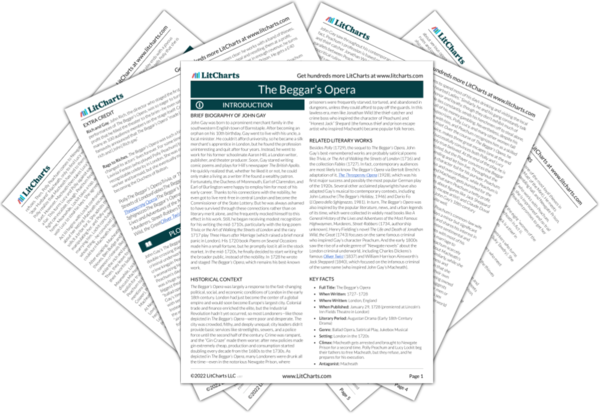The Player Quotes in The Beggar’s Opera
Introduction Quotes
If Poverty be a Title to Poetry, I am sure No-body can dispute mine. I own myself of the Company of Beggars; and I make one at their Weekly Festivals at St. Giles’s.
Act 3, Scene 16 Quotes
PLAYER. But, honest Friend, I hope you don’t intend that Macheath shall be really executed.
BEGGAR. Most certainly, Sir.—To make the Piece perfect, I was for doing strict poetical Justice.—Macheath is to be hang’d; and for the other Personages of the Drama, the Audience must have suppos’d they were all either hang’d or transported.
PLAYER. Why then, Friend, this is a down-right deep Tragedy. The Catastrophe is manifestly wrong, for an Opera must end happily.
BEGGAR. Your Objection, Sir, is very just; and is easily remov’d. For you must allow, that in this kind of Drama, ’tis no matter how absurdly things are brought about.—So—you Rabble there—run and cry a Reprieve—let the Prisoner be brought back to his Wives in Triumph.
PLAYER. All this we must do, to comply with the Taste of the Town.

The Player Quotes in The Beggar’s Opera
Introduction Quotes
If Poverty be a Title to Poetry, I am sure No-body can dispute mine. I own myself of the Company of Beggars; and I make one at their Weekly Festivals at St. Giles’s.
Act 3, Scene 16 Quotes
PLAYER. But, honest Friend, I hope you don’t intend that Macheath shall be really executed.
BEGGAR. Most certainly, Sir.—To make the Piece perfect, I was for doing strict poetical Justice.—Macheath is to be hang’d; and for the other Personages of the Drama, the Audience must have suppos’d they were all either hang’d or transported.
PLAYER. Why then, Friend, this is a down-right deep Tragedy. The Catastrophe is manifestly wrong, for an Opera must end happily.
BEGGAR. Your Objection, Sir, is very just; and is easily remov’d. For you must allow, that in this kind of Drama, ’tis no matter how absurdly things are brought about.—So—you Rabble there—run and cry a Reprieve—let the Prisoner be brought back to his Wives in Triumph.
PLAYER. All this we must do, to comply with the Taste of the Town.











